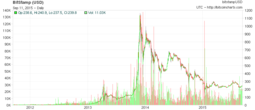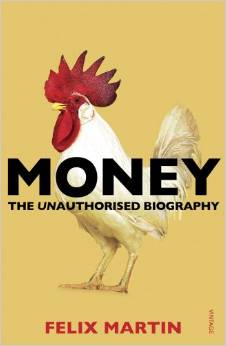Coining it
A former editor of mine explained to me once that one of the staples of British journalism is the forking subculture. He had a point: the pattern holds wherever you look, from fans of a particular TV show to sports associations. Now the fork threatens bitcoin, as the community debates an alteration to the underlying code.
I am on record as skeptical about bitcoin as a currency, and given that its price  in US dollars has gone from 8.5 cents in 2010 to over $900 in early 2014 to around $235 now, I still feel justified. But what has emerged more clearly in the last couple of years is that what we refer to as "bitcoin" is really two things: bitcoin-the-currency and the blockchain, the public, distributed ledger of transactions.
in US dollars has gone from 8.5 cents in 2010 to over $900 in early 2014 to around $235 now, I still feel justified. But what has emerged more clearly in the last couple of years is that what we refer to as "bitcoin" is really two things: bitcoin-the-currency and the blockchain, the public, distributed ledger of transactions.
For months, as reports such as this from Business Insider began warning a month ago, some of the leading names in bitcoinworld have been arguing over whether to increase the size of the blocks that make up the distributed public ledger at the heart of bitcoin - the blockchain. The limit currently in place was put there in 2010 as a temporary method for deterring spam and DDoS attacks while the network grew, but the plan was always to scale up as the number of transactions grew. Opponents of Bitcoin XT - the expanded block size version - see the proposals as an attempted coup that will result in the very centralization bitcoin was supposed to up-end - the connection being the claim that bigger blocks will require nodes to have more processing power and bigger bandwidth. Gavin Andresen, the MIT scientist introducing the change, disputes this interpretation. Ultimately, the decision about how to go forward is meant to be settled by the equivalent of a vote. If 75% of servers have adopted XT by January 11, the rest are supposed to follow suit. If they don't...it opens up the possibility that the same bitcoin could be spent twice, once on each fork of the blockchain, eradicating the most important element of this and every other monetary system: trust.
One of Andresen's points is that this type of situation was faced once before, and bitcoin survived. The story is told in detail in Nathaniel Popper's recent book, Digital Gold: the Untold Story of Bitcoin. As told by Popper, in March 2013 computers on the network disagreed over which block they were trying to mine. The cause was a software update: computers running the older software were rejecting by computers running the newer version. In this case, everyone agreed to revert to the older software and drop the coins minted since the update; the change cost the large mining pool BTC Guild over $5,000.
The Bitcoin universe was a lot smaller then, and so were the stakes: the BTC150 to 200 the move cost BTC Guild then would be worth something over $35,000 at today's prices. As the number of bitcoin users continues to grow the interests and motives of those users will continue to diversify. An open letter from a group of bitcoin developers asks the community to use upcoming meetings to build consensus. The community may still be small enough for that to work.
Money, as Felix Martin explained in Money: the Unauthorised Biography, is three things: a universal unit of value, an accounting system, and an authority that backs the whole thing and makes it scale.  In the case of bitcoin, the wild fluctuations in its price against nation-state currencies make it an iffy store of value; its safest use (for a fiscal coward like me) is as a temporary stepping stone. The young company Bitpesa does exactly that: you use your local currency to buy bitcoin, hand it off to Bitpesa, and it hands off local currency again to recipients in Kenya or Tanzania. At a 3% transaction fee, Bitpesa claims to be the cheapest way to send money to Africa. The accounting system side - the blockchain - looks set to become an important and disruptive platform for many types of financial transactions, as Preston Byrne, the CEO of Eris Industries, explained at this year's Tomorrow's Transactions Forum, calling the blockchain "a system for agreeing the truth".
In the case of bitcoin, the wild fluctuations in its price against nation-state currencies make it an iffy store of value; its safest use (for a fiscal coward like me) is as a temporary stepping stone. The young company Bitpesa does exactly that: you use your local currency to buy bitcoin, hand it off to Bitpesa, and it hands off local currency again to recipients in Kenya or Tanzania. At a 3% transaction fee, Bitpesa claims to be the cheapest way to send money to Africa. The accounting system side - the blockchain - looks set to become an important and disruptive platform for many types of financial transactions, as Preston Byrne, the CEO of Eris Industries, explained at this year's Tomorrow's Transactions Forum, calling the blockchain "a system for agreeing the truth".
For its earliest users, including disappeared inventor Satoshi Nakamoto, the whole point was to eliminate central authorities - only to find, as Popper notes - that ordinary users flocked to centralized wallets. One of the things Popper does well in his book is show the different reasons why people embraced bitcoin: US libertarians seeking a better version of gold to avoid government control; Argentinians facing rampant inflation, to whom anything looked better than the peso; China's gambling-loving culture. But bitcoin isn't at the beginning any more, and many more recent arrivals on the scene have a different set of motivations. Building solid, long-term businesses requires working with regulators instead of opposing their existence on principle.
Bitcoin today is something that isn't on Martin's list: it's a community. It won't be able to stay that way. Community does not scale.
Wendy M. Grossman is the 2013 winner of the Enigma Award. Her Web site has an extensive archive of her books, articles, and music, and an archive of earlier columns in this series. Stories about the border wars between cyberspace and real life are posted occasionally during the week at the net.wars Pinboard - or follow on Twitter.